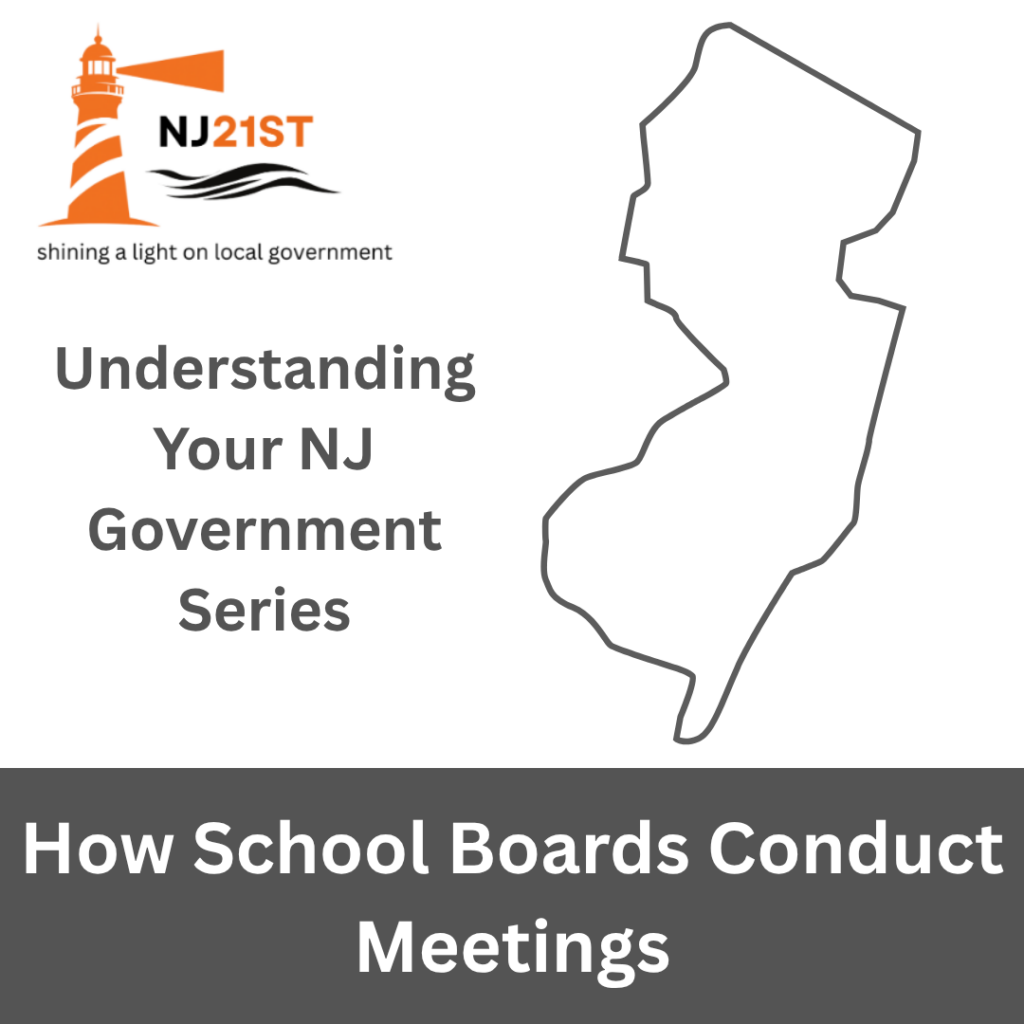[responsivevoice_button voice=”UK English Female” buttontext=”Listen to the Article Instead”]
The sixth article in an ongoing series intended to help NJ residents, especially students, understand their local and state government.
In our fourth installment of the series we covered how BOEs are responsible for local school districts. BOEs are required to adhere to the Open Public Meetings Act (OPMA) that, as we mentioned in our last article, requires publication of meeting notices and agendas.
Understanding your BOE agenda and what is required to be reported on during meetings can help you become more informed and effective in holding your local school district accountable.
In this article we will use the Berkeley Heights agendas from this calendar year as an example.
Call to Order and Meeting Notice
Like the Town Council, meetings start with a call to order, the Pledge of Allegiance, and a roll call to verify that a quorum is present. The Meeting Notice Statement, required by OPMA, confirms that the meeting was advertised to the public at least 48 hours in advance. The notice must include the date, time, and location of the meeting and confirm that it is open to the public. Without this, no official action can be taken.
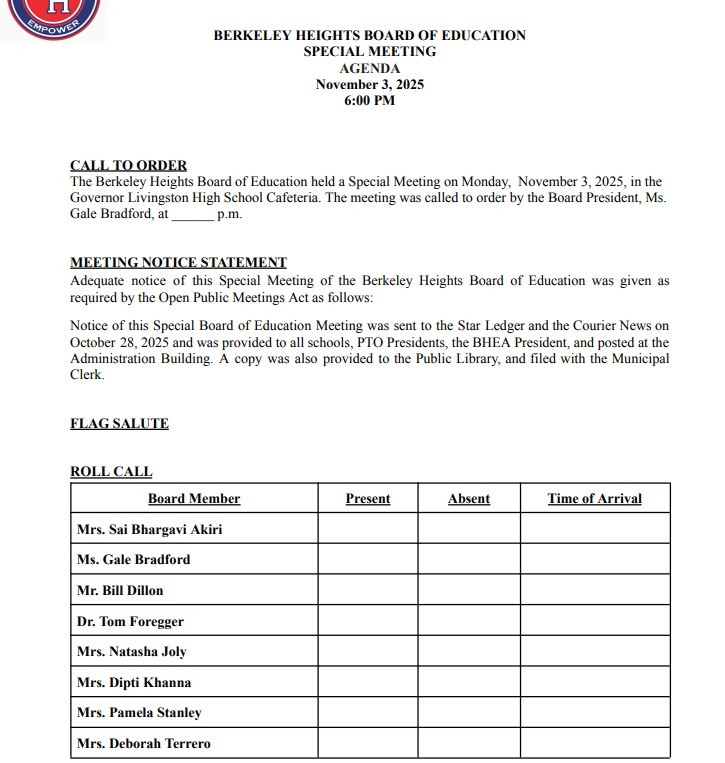
Executive Session
Boards are allowed to meet privately in Executive Session under limited and specific circumstances when student privacy, personnel issues, collective-bargaining negotiations, or pending litigation are at play. The specific legal reason must connect to N.J.S.A. 10:4-12(b). The discussion summary must be made available once confidentiality no longer applies.
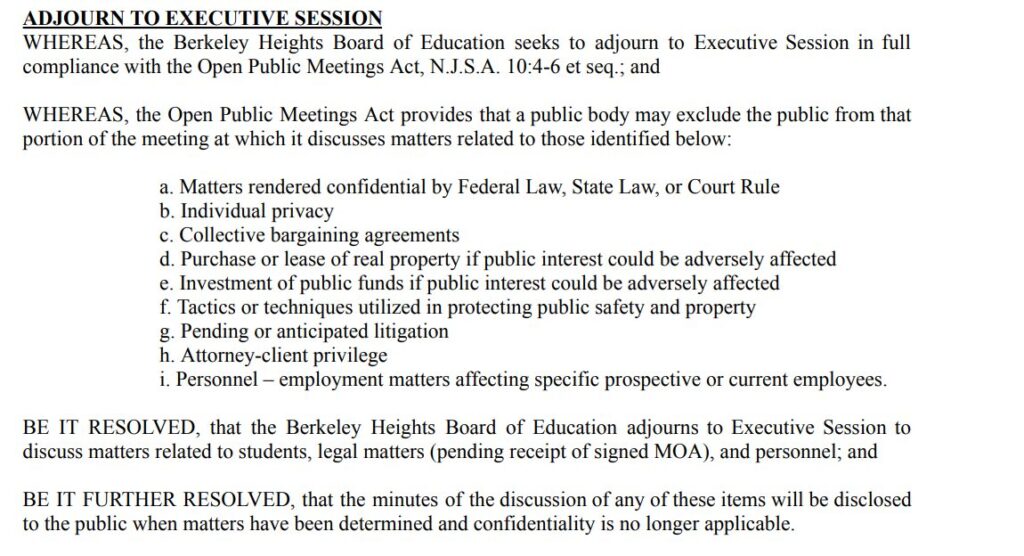
Robert’s Rules of Order
Where the OPMA governs openness, Robert’s Rules governs procedure. Most BOEs adopt them into their bylaws as a means of adding cohesion to debate, ensuring a kind of order that allows the public to follow the meeting and to maintain transparency.
The basic skeleton…
- Every vote begins with a motion and a second.
- BOE members are recognized by the Board President before speaking.
- All votes involving spending or policy must be recorded by name in the minutes.
Superintendent and Business Administrator Reports
This section contains several items that are required to be announced by state law and/or regulation, which include
- Student assessment results such as NJSLA, Start Strong, or graduation proficiency data
- Harassment, Intimidation, and Bullying (HIB) report and the School Safety Data System summary required twice each year
- Student achievements and recognition (National Merit Scholar honors or athletic awards)
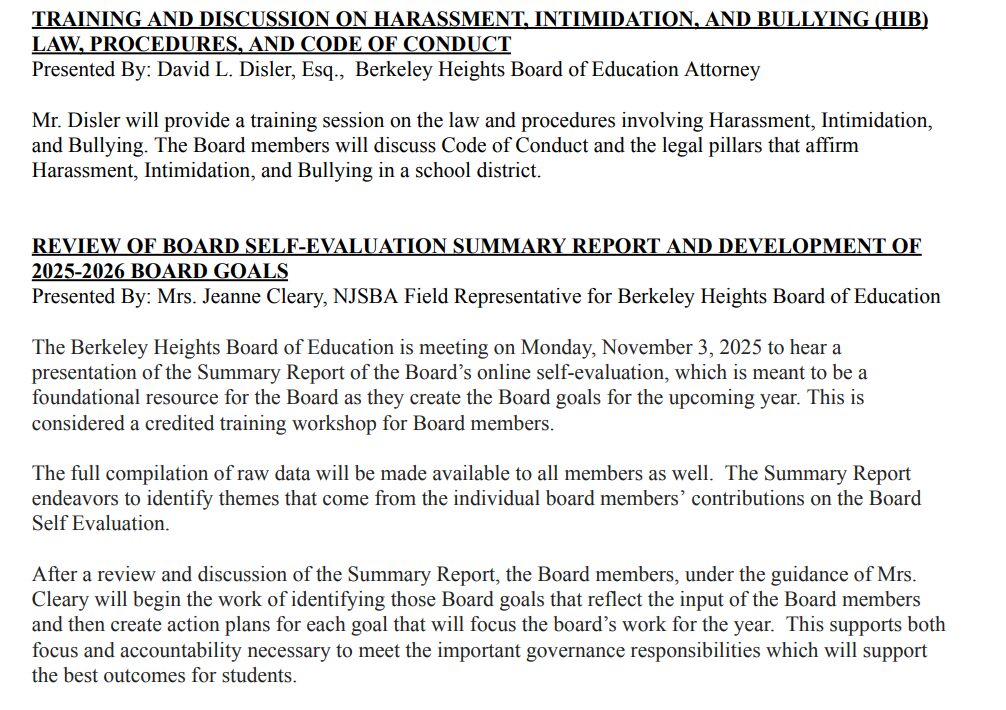
During this section, the Superintendent also provides updates on enrollment, curriculum goals, and district initiatives.
The Business Administrator or Board Secretary (usually they are one and the same) certifies the budget, presents transfers, and confirms compliance with state fiscal regulations.
There is a logic to the placement of these items; they offer a broad insight into the operations and performance of the district before the Board votes on finances, policy, and other impactful items.
Public Comment
Most BOE agendas include two comment periods, one limited to items on the agenda and another near the end for any topic.
Members of the public usually have three minutes and must address the chair (usually the BOE President).
Boards can set time and conduct rules but cannot block criticism or deliberate privately.
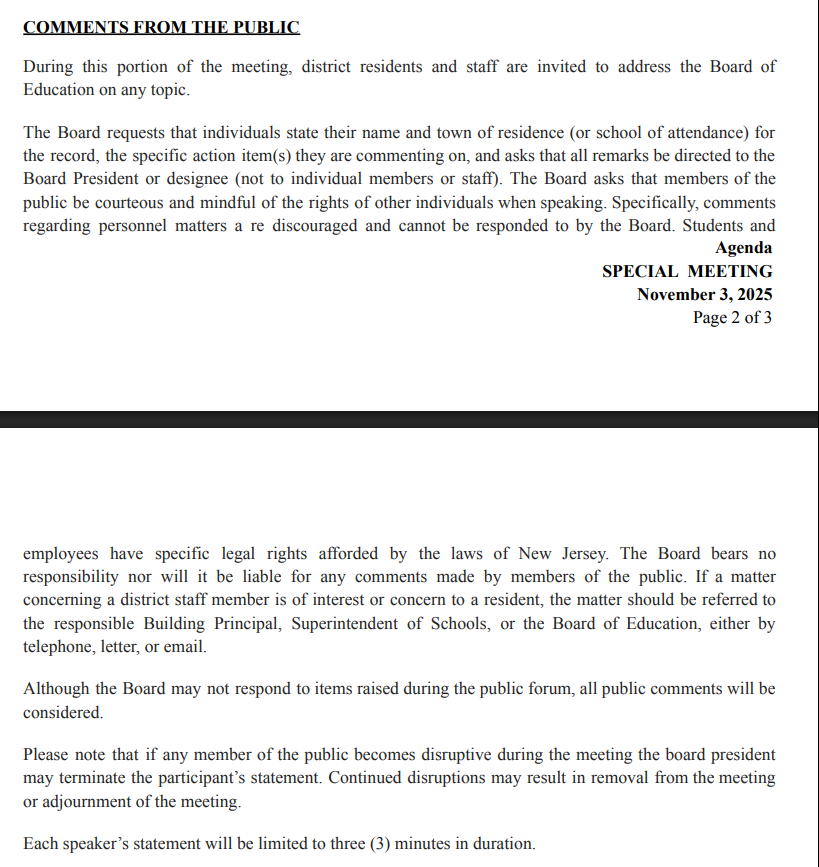
State law requires boards to allow the public to be heard before taking action.
In the past, NJ courts have affirmed the public’s right to speak and have ruled against improper censorship.
Minutes
Minutes serve as the permanent record of the meeting and must list
- Attendees
- Topics discussed
- How each member voted
Minutes must be made promptly available to the public. Even Executive Session minutes must be made available but, due to the confidential nature of what has been discussed, do not contain as much detail.
In the past, Boards have gotten in trouble for using Executive Sessions improperly or for providing minutes from Executive Session that have been too vague.
Finance
The finance section covers district spending and budget actions.
Typical items include…
- Approval of payroll and bills
- Budget transfers (watch these carefully)
- Capital-reserve withdrawals (facility projects)
- Grant acceptances and community donations
- Annual audit presentations and certification of the Annual Financial Report
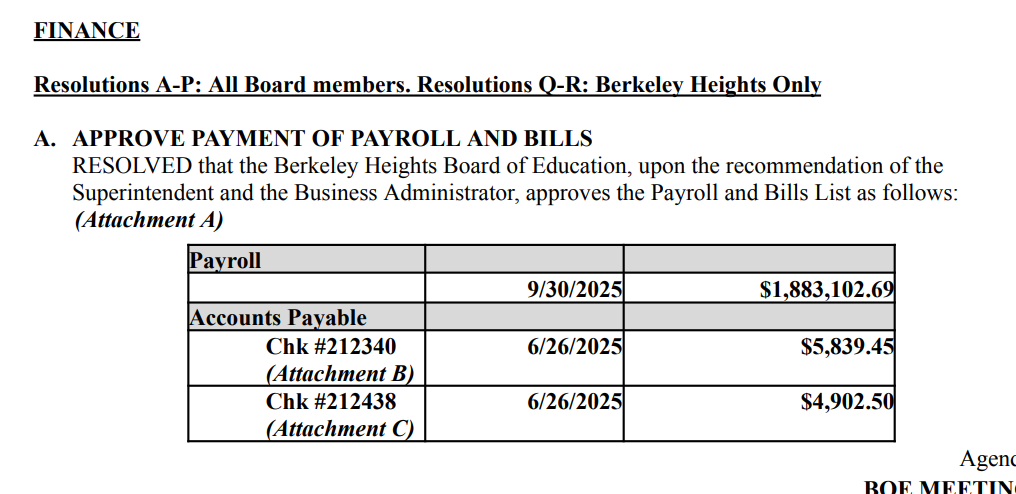
Personnel
Personnel items are also governed by state law and include…
- New hires, resignations, and salary adjustments
- Leaves of absence
- Stipends
- Coaching or club appointments
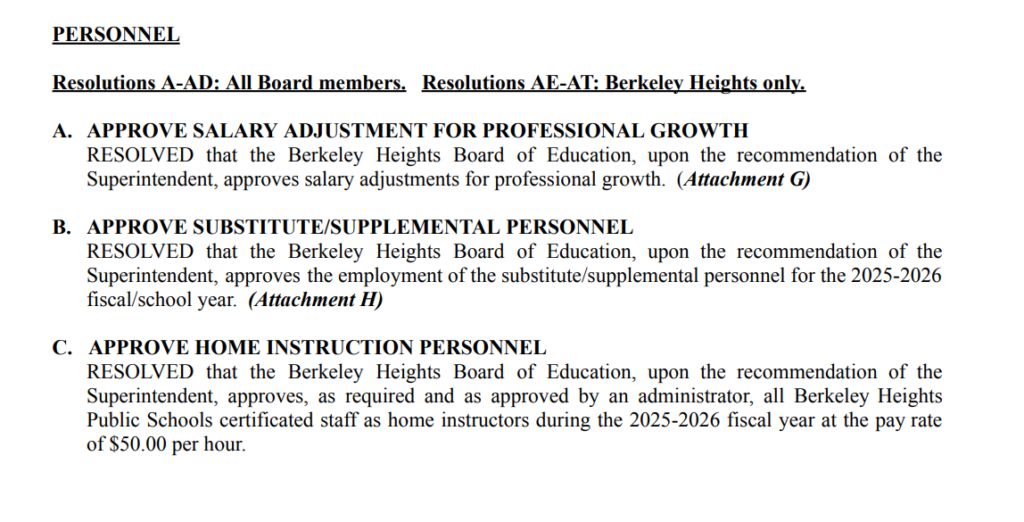
By law, all staff recommendations from the Superintendent must be voted on publicly, and new appointments, retirements, and tenure decisions must appear on the agenda.
Education and Curriculum
This part of the meeting includes instructional programming, placements and can include…
- Approval of new courses or textbooks
- Dual-enrollment agreements with colleges
- Out-of-district placements
- Field trips
- New student clubs
- Annual Testing Reports
- School Self-Assessment (Anti-Bullying Bill of Rights)
- State or Federal Grant Plans (Title I or IDEA)

Policy
Each new policy, regulation or revisions to either requires two meetings for approval…the first for review and the second for a final vote on adoption.
Once approved, policies carry the same weight as local law and stay in effect until they’re repealed or amended.
Examples include…
- Updates to bylaws
- Curriculum standards
- Fiscal controls
- Ethics
- Procurement rules
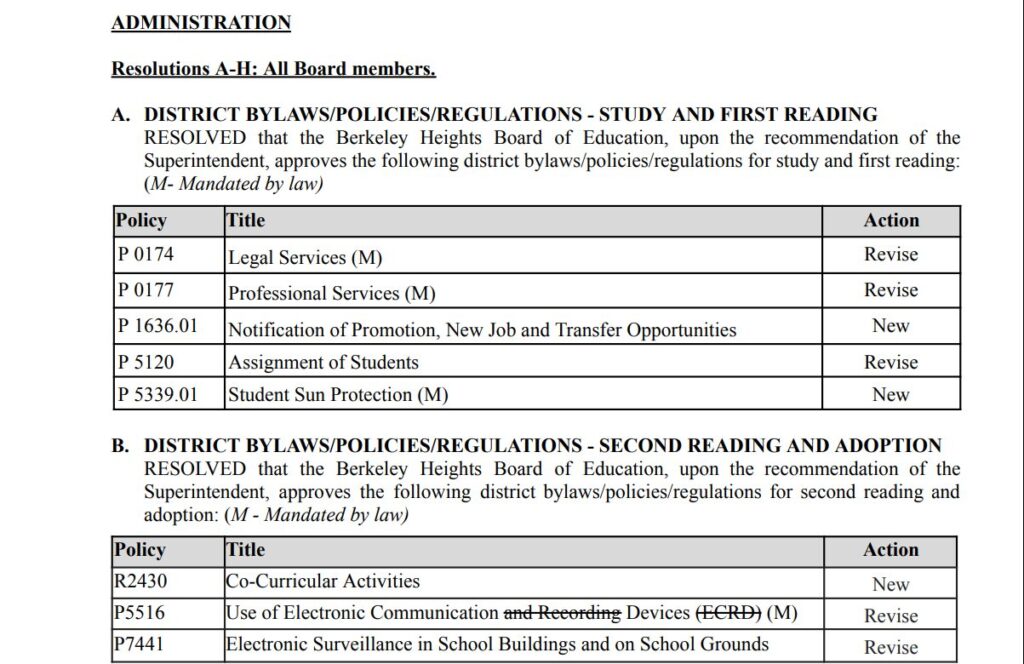
Committees, Liaison Reports and Adjournment
Standing committees (Finance, Curriculum, and Policy as examples) provide updates on their work. Liaisons can also report on work with community organizations and municipal government.
The meeting concludes with new or old business, any final public comment, and a motion to adjourn.
How to Read a Board of Education Agenda
What each section means, what OPMA requires, and how to use meetings to hold your district accountable.
- Notice and Quorum OPMA requires public notice at least 48 hours before the meeting. No notice means no official action.
- Executive Session Limited to specific reasons under N.J.S.A. 10:4-12(b). A summary must be released when confidentiality ends.
- Robert’s Rules Most boards adopt them to keep debate orderly. Every action needs a motion and a second. Roll call for spending and policy.
- Reports Superintendent and Business Administrator cover assessments, HIB and safety data, enrollment, budget certifications, and transfers.
- Public Comment Usually two periods. Boards must allow comment before taking action. Time limits are allowed but censorship is not.
- Minutes Public record listing attendees, topics, and how each member voted. Executive minutes are released with limited detail when appropriate.
- Finance Bills, transfers, capital reserve, grants, donations, and the annual audit are presented and voted on.
- Personnel Hires, resignations, salaries, leaves, stipends, and appointments are voted on in public.
- Education and Curriculum Courses, textbooks, dual enrollment, placements, field trips, testing reports, ABR self assessment, and grant plans.
- Policy Typically reviewed over two meetings before adoption. Once approved, policies remain until amended or repealed.
- Committees and Adjournment Committee and liaison updates, final public comment, then motion to adjourn.
Update 11/12/2025:
We got some good feedback as an enhancement to the article:
Roberts Rules:
Robert’s Rules governs procedure. Most BOEs adopt them into their bylaws
There’s a hierarchy for procedure. Bylaws take precedence, then parliamentary procedure standards.
There are alternatives to Robert’s Rules, such as The Standard Code of Parliamentary Procedure. Whether it’s in the bylaws, the board could adopt a resolution for any standard for parliamentary procedure it wants.
Public Comment
While the presiding officer may reply to questions after the session has closed, this is typically a one way street of communication: you to the board only.
See All Articles in the “Understanding Your NJ Government Series”
|
